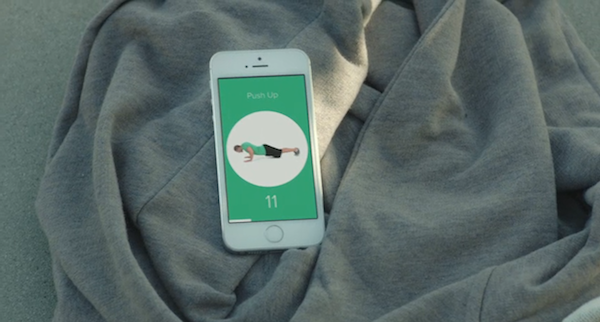
Amid the countless number of startups at the Ryerson Digital Media Zone is group of seven individuals. You can’t tell by looking at them, but they make up one of Toronto’s premier app development studios. Their name is Tiny Hearts, and while you probably haven’t heard of them, you’ve certainly used one their apps, seen them featured in TV commercials or read about them in publications like Tech Crunch, The New York Times and Lifehacker.
Tiny Hearts was founded in 2010 by Robleh Jama. He was fresh off an exit from a previous startup and decided he wanted to try his hand at mobile app development. He created and released the company’s first app, Pocket Zoo, an educational game that teaches children about zoo animals, in May 2010; that same month Jama’s first child was born. In fact, it’s Jama’s daughter and wife that helped give the studio its charming name. While waiting for their child to be born, Jama and his wife would visit a midwife’s clinic and use the machinery there to listen to their unborn daughter’s heartbeat. That action gave Jama the idea to call the studio Tiny Heart Beats. After his wife heard the name, she suggested that Tiny Hearts sounded better and the name stuck.
The studio followed Pocket Zoo with a card game for Instagram called InstaMatch, and though they’ve since removed the app from the App Store due a dispute with Facebook and Instagram, InstaMatch was a success. Both InstaMatch and Pocket Zoo were featured by Apple and sold enough to allow Tiny Hearts to create an app called Wake.
In terms of design, polish and user interaction, Wake is the company’s crowning achievement. The app’s beautiful design and the subtle beeps and bops it makes while the user navigates its menus make the app a joy to use. It helps make the arduous task of waking up in the morning almost bearable.
 Wake also became Tiny Hearts’ most successful app to date. In the year it was released it broke into Apple’s top 30 paid apps category—in the process becoming Tiny Hearts’ most downloaded app—and received universal praise from the media. The Unofficial Apple Weblog, for example, said, “Of all the many alarm apps that are on the market, Wake Alarm is without a doubt the most intuitive and beautiful.”
Wake also became Tiny Hearts’ most successful app to date. In the year it was released it broke into Apple’s top 30 paid apps category—in the process becoming Tiny Hearts’ most downloaded app—and received universal praise from the media. The Unofficial Apple Weblog, for example, said, “Of all the many alarm apps that are on the market, Wake Alarm is without a doubt the most intuitive and beautiful.”
The app’s success came at a cost, however; the entire Tiny Hearts team had to invest long hours of overtime to ensure that every one of Wake’s features and interactions were perfect. According to Jama, “We ended up spending less time taking care of ourselves, going to the gym and eating right.” In an effort to return to some semblance of a healthy lifestyle, he started looking for a workout he could do in the limited amount of free time he did have. That’s when he discovered the 7-Minute Workout.
Jama admits with a smile that the workout “kicked his butt” the first time he tried it, but that there was something about its simplicity that excited him. The beauty of the workout, which is based on the concept of high interval training, is that it does not require any equipment and can be done almost anywhere. In other words, it’s a perfect match for mobile.
Jama showed the workout to his team and they quickly set about to creating an app that was built around it. However, they wisely decided to also include several other quick workouts, including a 15-minute yoga routine and a 4-minute workout based on the Tabata Protocol. Quick Fit was born.
Tiny Hearts’ previous successes on the App Store had helped establish a formal relationship between the studio and Apple, and when Quick Fit was nearing the end of its development, the tech giant’s ad agency came calling. They told Jama that they were thinking about featuring the app in an upcoming iPhone commercial. Despite what a coup like that would mean for the studio, Jama says he tried to temper his excitement.
 But as days and weeks passed Apple’s ad agency kept emailing Tiny Hearts, asking for additional materials relating to the app. Finally, Apple’s Strength commercial aired in international markets. Halfway through it a man can be seen doing pushups with the help of Quick Fit. Overnight the studio saw a dramatic increase in the number of users downloading Quick Fit. On the Italian App Store, for instance, Quick Fit surged to become the 26th most downloaded app overall and 5th most downloaded fitness app. Likewise, on the French App Store Tiny Hearts saw a 300 per cent increase in the number of Quick Fit downloads and in-app purchases. Moreover, iPhone users in non-traditional smartphone markets started to download the app. Now, for example, iPhones as far away as Botswana have this piece of Toronto installed on their solid state drives.
But as days and weeks passed Apple’s ad agency kept emailing Tiny Hearts, asking for additional materials relating to the app. Finally, Apple’s Strength commercial aired in international markets. Halfway through it a man can be seen doing pushups with the help of Quick Fit. Overnight the studio saw a dramatic increase in the number of users downloading Quick Fit. On the Italian App Store, for instance, Quick Fit surged to become the 26th most downloaded app overall and 5th most downloaded fitness app. Likewise, on the French App Store Tiny Hearts saw a 300 per cent increase in the number of Quick Fit downloads and in-app purchases. Moreover, iPhone users in non-traditional smartphone markets started to download the app. Now, for example, iPhones as far away as Botswana have this piece of Toronto installed on their solid state drives.
“It’s great to get good press, but once you have users saying good things about the app, then you know you’ve done something right,” says Jama. As of the writing of this piece, the app has an average rating of four-and-a-half on both the American and Canadian App Stores. With Quick Fit, Tiny Hearts not only has a critical hit, they have a massive commercial hit.
The irony of that success is that the studio has spawned a number of imitators. Android owners cannot currently download Tiny Hearts’ app on the Play Store, but a search for “Wake” reveals 250 alarm clock apps, many of which look very eerily to Tiny Hearts’ creation. Likewise, a search for “Quick Fit” will bring back 7-Minute Workout apps that also ape the studio’s beautiful design aesthetic. “I used to be upset about these apps,” says Jama. “But then I downloaded and tried them, and I don’t think they’ve nailed the experience the way we have.”
That said, the success of Quick Fit doesn’t mean the studio will limit itself to fitness apps; if anything, its next app will be as different from Quick Fit as that app is to Wake. If Tiny Hearts’ apps seem all over the map in terms of their intended use, it’s because Jama has never been one to say no to exploring an idea that interests him. “What ties our apps together is the idea of scratching our own itch and creating products that make people’s lives better in small but meaningful ways,” he says. “We’re not going to limit ourselves to one product or one category of product. Tiny Hearts is an opportunity to dabble in a lot of different areas.”
Indeed, their next app has the potential to help iPhone users in a small but meaningful way, and in a way that hasn’t been possible to do so on iOS until relatively recently. Jama and company are quiet about exactly what their next app will be, but they promise it will include all the sophistication and polish of their efforts. And for a studio that wants to be one of the best app developers in the world, it might just catapult them there.
Photos by Dylan Leeder.
____
Igor Bonifacic is the managing editor of Toronto Standard. Follow him on Twitter.
For more, follow us on Twitter and subscribe to our newsletter.














